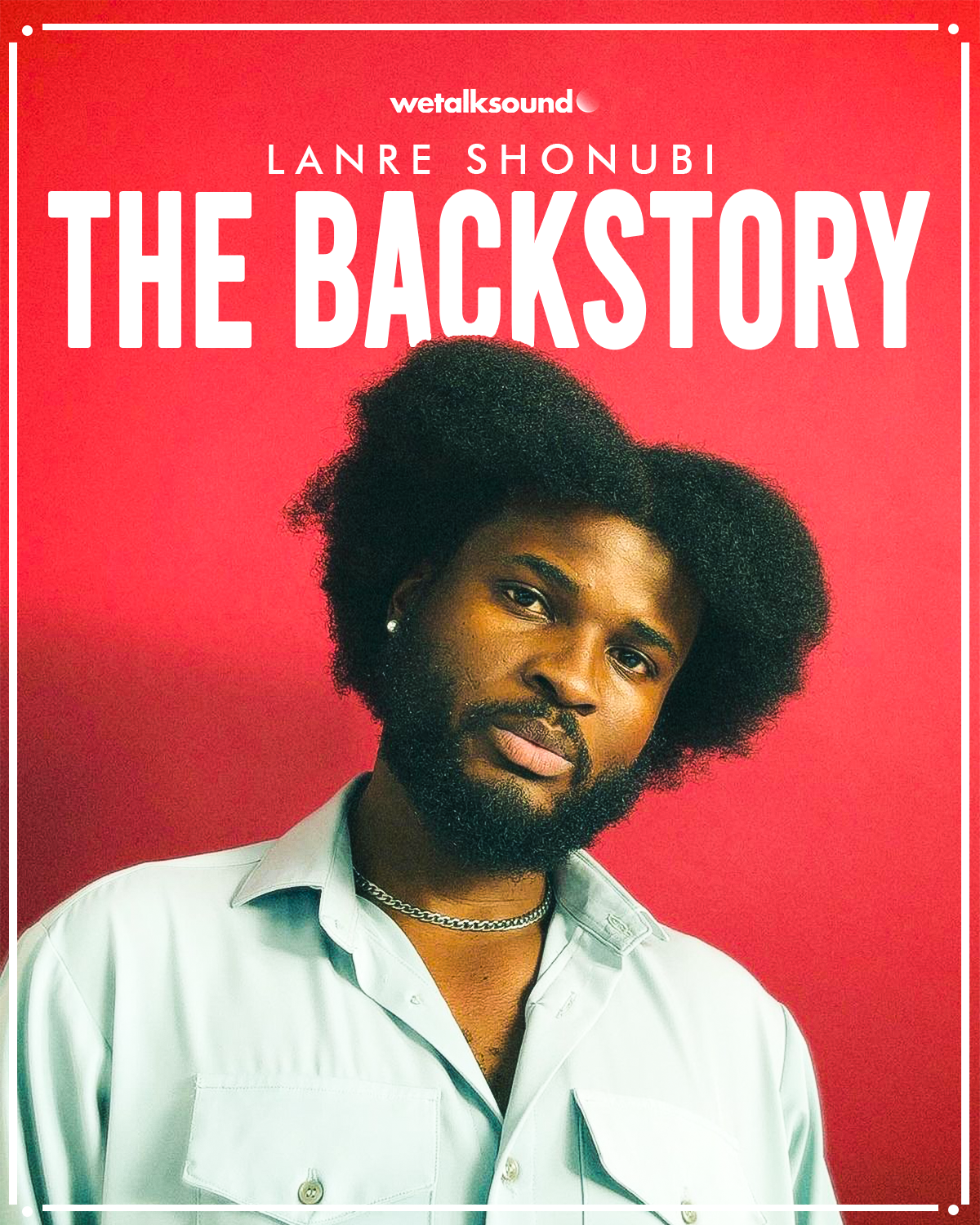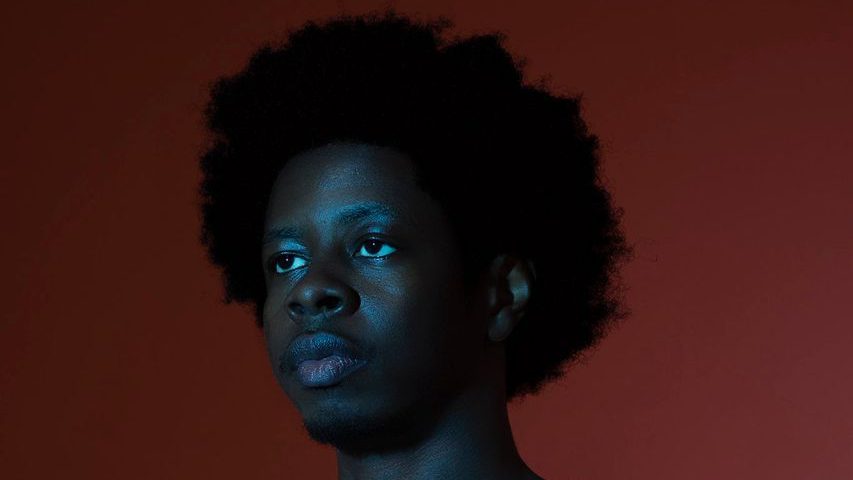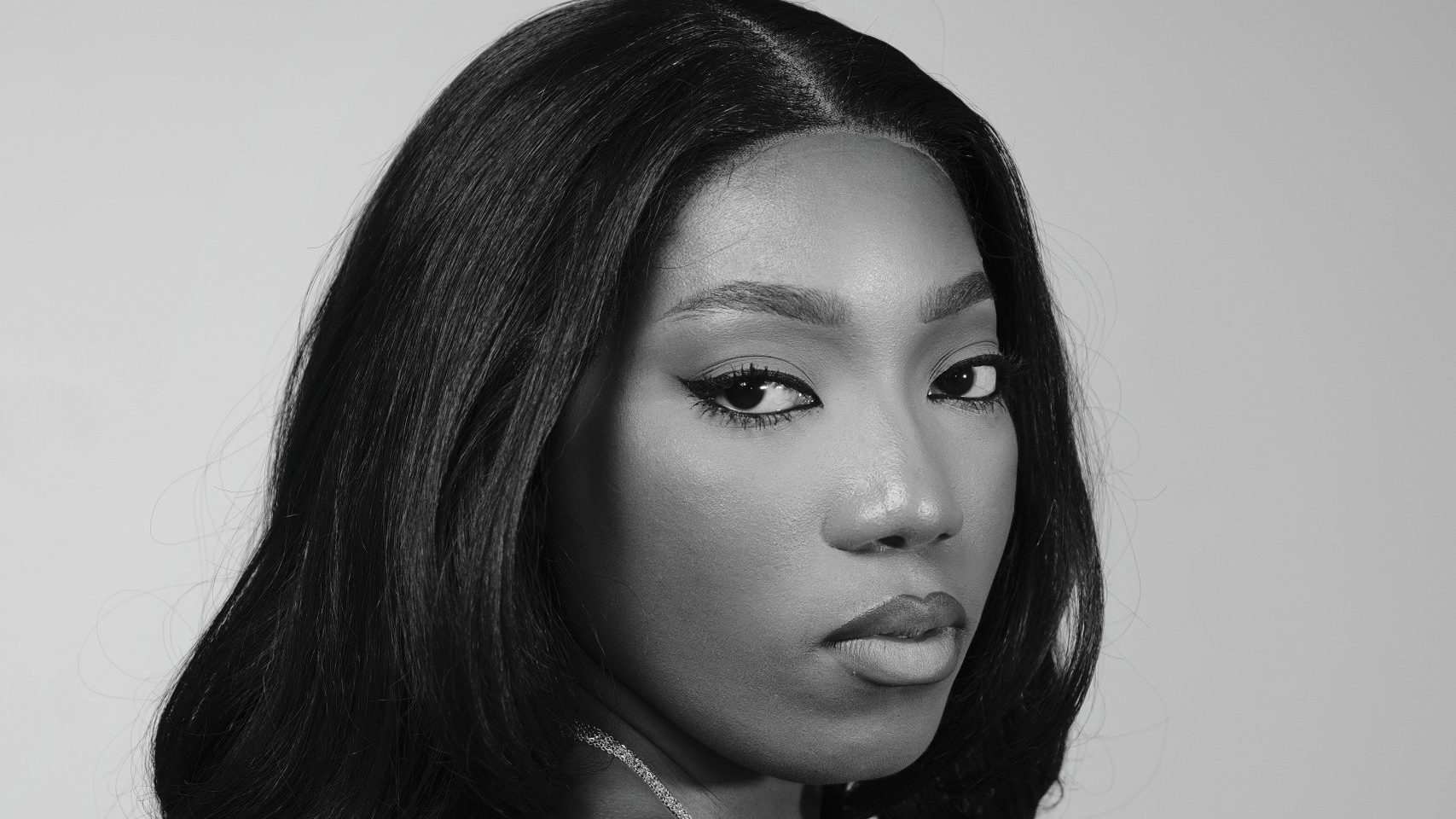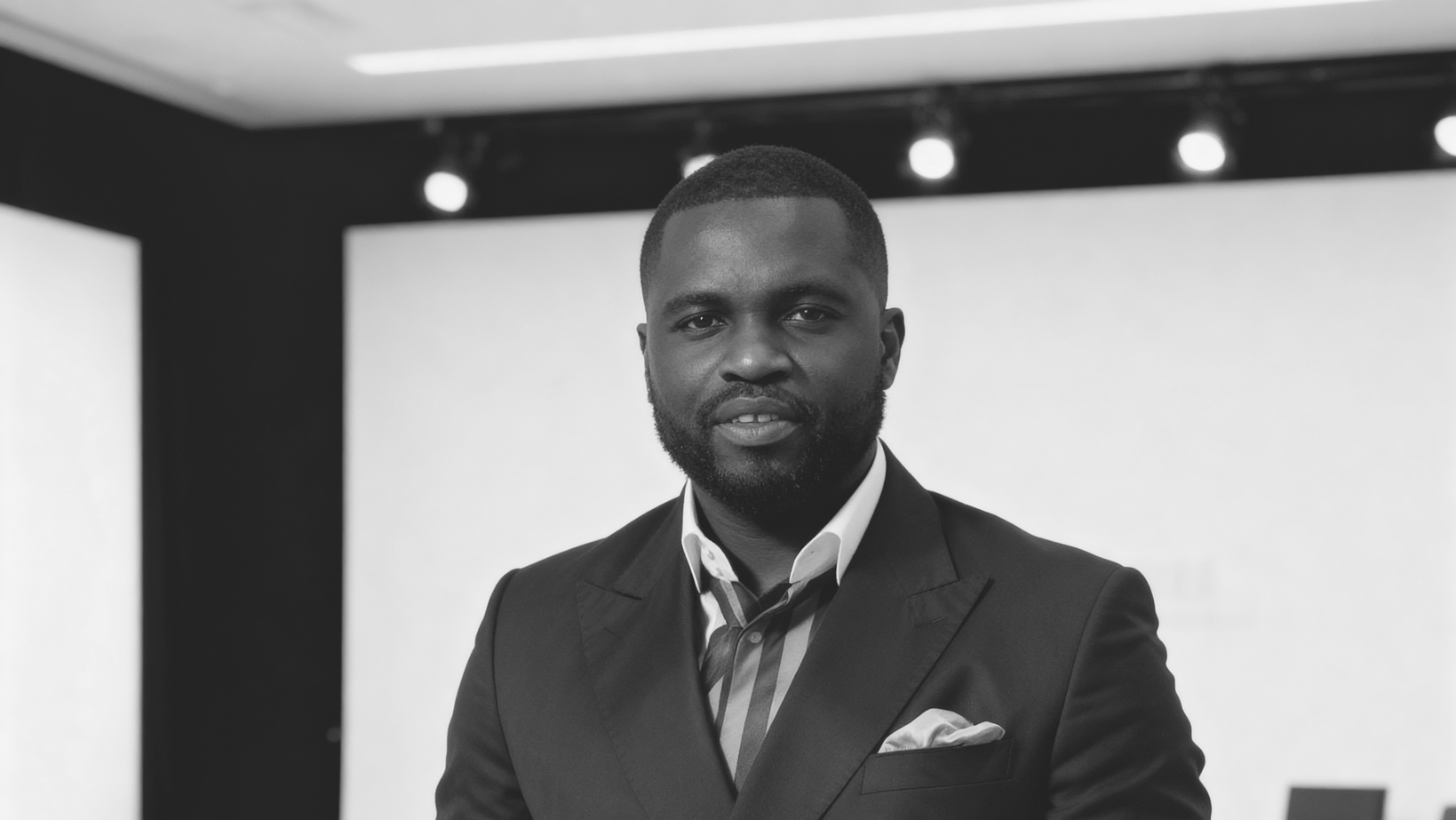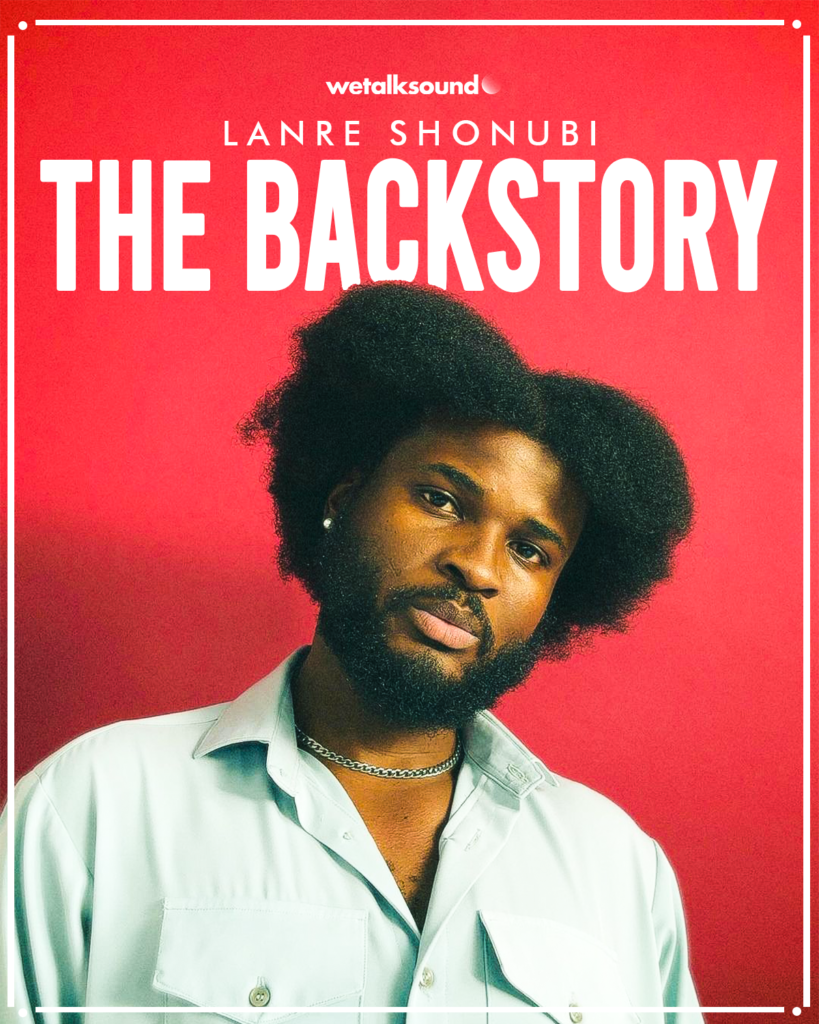
Nothing, whether people or ideas, products and brands are created in a vacuum. Everyone and everything has an origin story and for people who were made to inspire, they have an additional edge; a driving force. In our very first edition of “The Backstory”, we speak to trailblazing media personality Lanre Shonubi, tracing his footsteps from Ajah all the way to the UK where he’s earned his chops as an Afrobeats broadcaster on BBC1xtra, an Afrobeats host, among others.
Questions
What songs and albums did you listen to growing up?
In retrospect , my first awareness of music was faint sounds of Sir Sina Peters ‘Dodo Ati Rice’ cause my mum would sing that to me outside my regular cradle songs, she would also sing ‘Love Me Jeje’ by Seyi Sodimu. I grew up listening to a lot of gospel music, in my early childhood it was mostly Yoruba gospel music. As I grew older, I started finding my own music— I became aware from primary school when kids from different backgrounds would come to school to talk about stuff. Then I started hearing of other artists from outside the country. I heard of DMX, 2pac and Biggie, ETC and how they hated each other. Then I discovered TLC; Scrubs and learnt the whole choreo (don’t ask me to do it) from there that was it, I just started absorbing everything. I’ll watch Music Africa after school, sneak to MTV and channel O to watch 1 or 2 videos because my dad must not catch us watching “disco music video”. I will say growing up my music came from everywhere and people around but I always found my way back to my roots, Afrobeats.
How did you discover your love and interest in music journalism?
My love for music journalism started when I would hear presenters like Dan Foster (God rest his soul), Manny and the Angels, Toke Makinwa, Big Thyme (God rest his soul), Arthur, IK, DJ Snoop the Damager ( He was the god of hip hop), Valeri of Cool FM, Yaw and many more on the radio, they played some of the coolest songs in the world and talked to some of the most interesting artists, I just picked interest in this very unique way of playing music and that was it. Then I came back home on that old desktop with my dad’s headphone that had a mic and I would try to imitate these presenters, I couldn’t play a song but I could do the talking so I did, my dad also had this Fujifilm digital camera so I would somehow connect it to the TV and start presenting a whole top 10 show, even if I didn’t know what i was saying I would just try to talk like the South African presenters I saw on Channel O or the radio presenters I listened to on my way home. I would save these recordings and play it to my mum. She was so shocked as to how I knew how to do all these wild things and when her friends came over she would ask me to play it for them. They loved it too lol! Anyway the rest is history and today I am here doing exactly what I taught myself to do as a 7 year old boy from Ajah lagos.
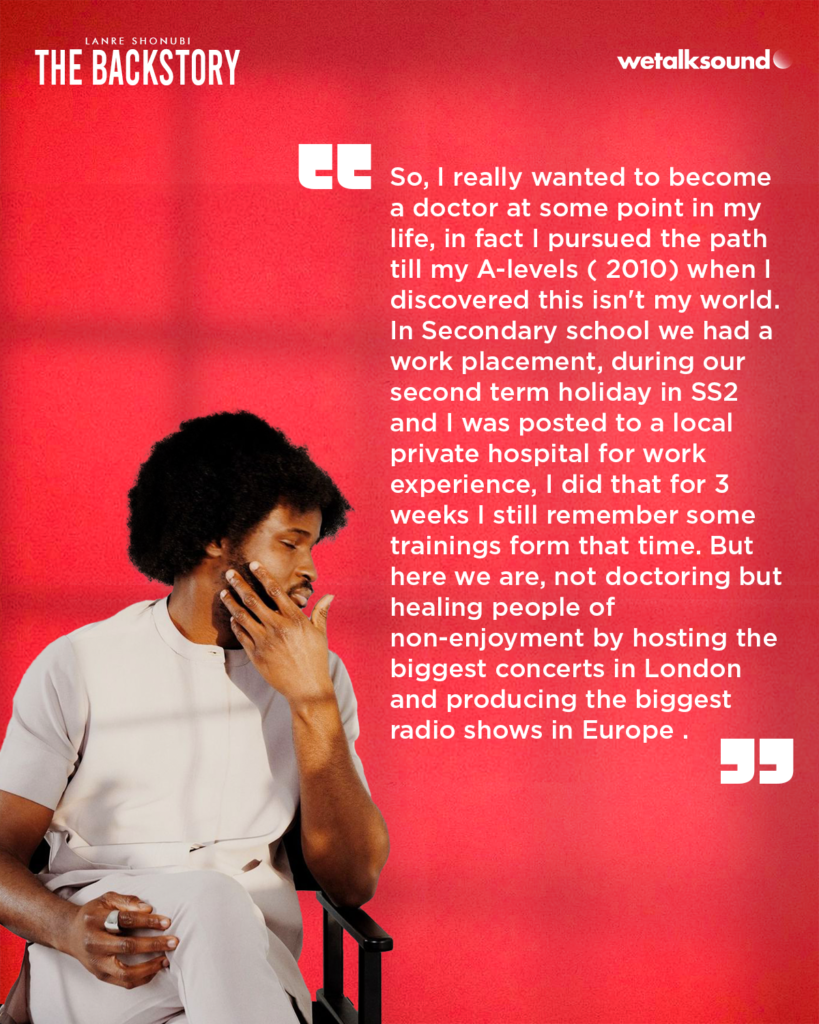
If you were not a journalist/media personality or in the music industry, what other career paths would you have taken?
So, I really wanted to become a doctor at some point in my life, in fact I pursued the path till my A-levels ( 2010) when I discovered this isn’t my world. In Secondary school we had a work placement, during our second term holiday in SS2 and I was posted to a local private hospital for work experience, I did that for 3 weeks I still remember some trainings form that time. But here we are, not doctoring but healing people of non-enjoyment by hosting the biggest concerts in London and producing the biggest radio shows in Europe .
Having worked in both Nigeria and lthe UK, what struck you most about the differences in journalism/broadcasting between the two countries?
Very interesting, these two countries are very similar and different at the same time. It is a very analogous situation, and I will explain. These two countries want the same thing and have the same goals which is, to produce pristine, objective and impartial broadcasts with world class facilities through world class broadcasters but the big difference is the execution of these goals. I will leave that to you my reader to deduce. My time broadcasting in London has opened my eyes to the time consciousness, precision, organization, quality, authenticity, impartiality and taste. The BBC is probably the zenith for any broadcaster’s career and I have tasted what it means to curate information for a much more diverse audience.
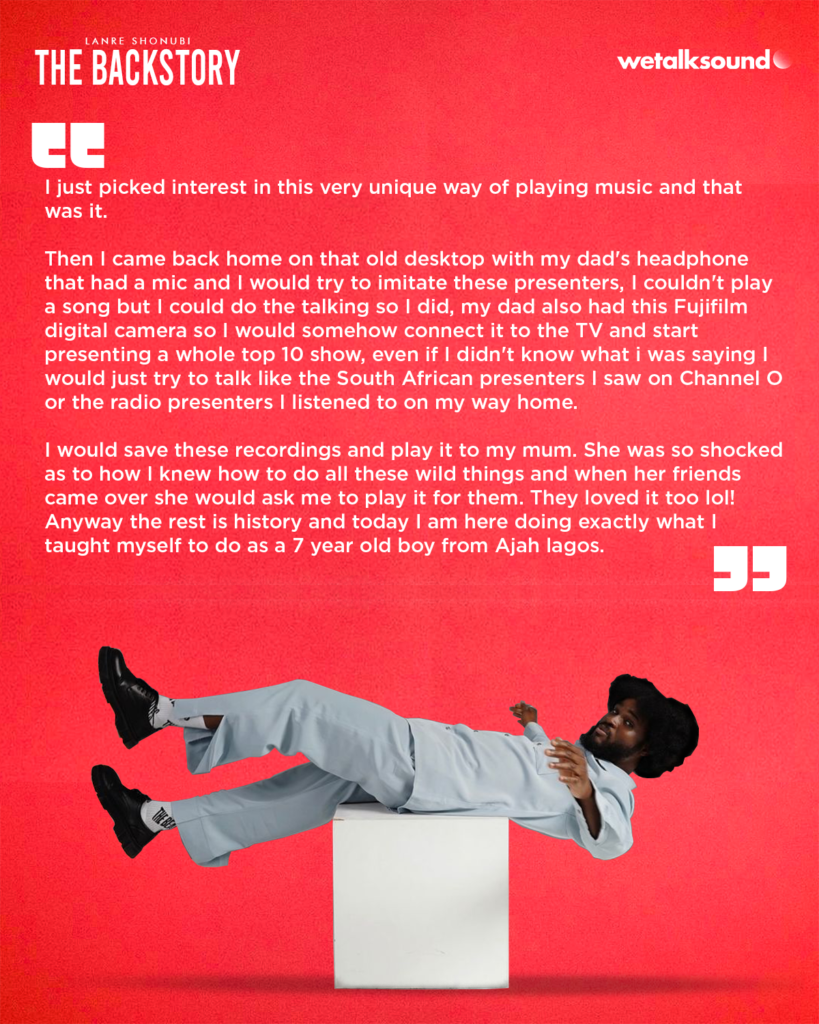
What do you think is the responsibility of the journalist/media personality to their audience?
The responsibility of a journalist varies with their kind of journalism. We have the political journalist who must always make sure to stay objective, dive deep into research before speaking amongst other roles and responsibilities, there’s the investigative journalist who must always campaign for the truth. For an entertainment/ music journalist like myself, awareness is important, research is key, wittiness is almost a must, understanding some of the laws that govern the entertainment industry is also a very important part of the job of a journalist that specialties in broadcasting entertainment. Another important role or responsibility of a journalist is to embrace empathy in order to relate more to their audience.
Who are the young African/Nigerian media personalities you’re most excited about today (and why?)
I am so excited for the future of journalism and just the creative industry in Nigeria as we have a plethora of young people from the continent pushing boundaries and doing this thing in their own little/big ways highlighting very important moments in the culture. Korty, Tayo Aina, Swit Ope, Jay On air, Laila Johnson Salami, Layi, Emmanuel Awoniyi, Elle Erinle, Gracey Mae, Kulupsy, Kolapo, Kemi Smallz, Meshky, Kasope Owoaje, Sam Dandy, Abdulazeez Labaika, Demola Falomo, Deniyi Mayowa , Olumide Ogunwuyi, Ebuka Nwobu and many more. All these young people listed above have in one or the other contributed to the African story in the last decade and they are not stopping anytime soon. I also foresee a future where they start to collaborate with bigger media corporations like the BBC to share deeper insights on Africa to the rest of the world.
Who are the young African/Nigerian artistes you’re most excited about today (and why?)
I love to talk about this now because now more than ever we need to let the older generation know that the sounds of the large continent of Africa is not going anywhere, not sure where all that notion came from in the first place. I’ll just make a list of the young artists I have been jamming with in the last few months and I’ll urge you to listen to them to see why they are special . Tems, Tyla, Ayra Starr, Yimeeka, Joshua Baraka from Uganda, Kold AF, Sgawd , OAG, Manana from Eswatini, Bourous from Kenya, Kojo Blak from Ghana, Moily from Ghana, Lasmid from Ghana, Black Sherif from Ghana, Odumodublvck, Victony, Raebel, Taves, Shine TTW, YKB, Life Size Teddy, Bloody Civilian, and many more.
If you were to introduce someone who’s never listened to Afrobeats to the genre, what three songs and three albums would you recommend?
Ayy, I love this one and I hope I do justice to the iconic sound of Afrobeats.
Songs:
Soso – Omah Lay
Only me – 2baba
Dami Duro – Davido
Albums
Omah Lay – Boy Alone
Burna boy – L.I.F.E (Leaving An Impact For Eternity)
Wizkid – Superstar
What other genres of music do you listen to outside Afrobeats?
I listen to alot of genres but for the purpose of the question and my latest indulge, I will say RnB, Neo Soul RNB, I explore a little bit of Jazz, Indie Rock, Deep house, Hip hop and more.
Considering your experience working with artists, what advice would you give to artists trying to break into the music industry?
I will say “create your own path, observe and understand the template and create your own formula from scratch and finally, make sure you are growing at every point in your journey.
As a media personality, you often get pre-release access to music. Can you recall a song you heard beforehand and felt confident about its future success?
Woow! So many songs but I will say Soweto by Victony. I am so proud of that record cos I heard it once and said “Dafe this is a jam bro! This is the record.”
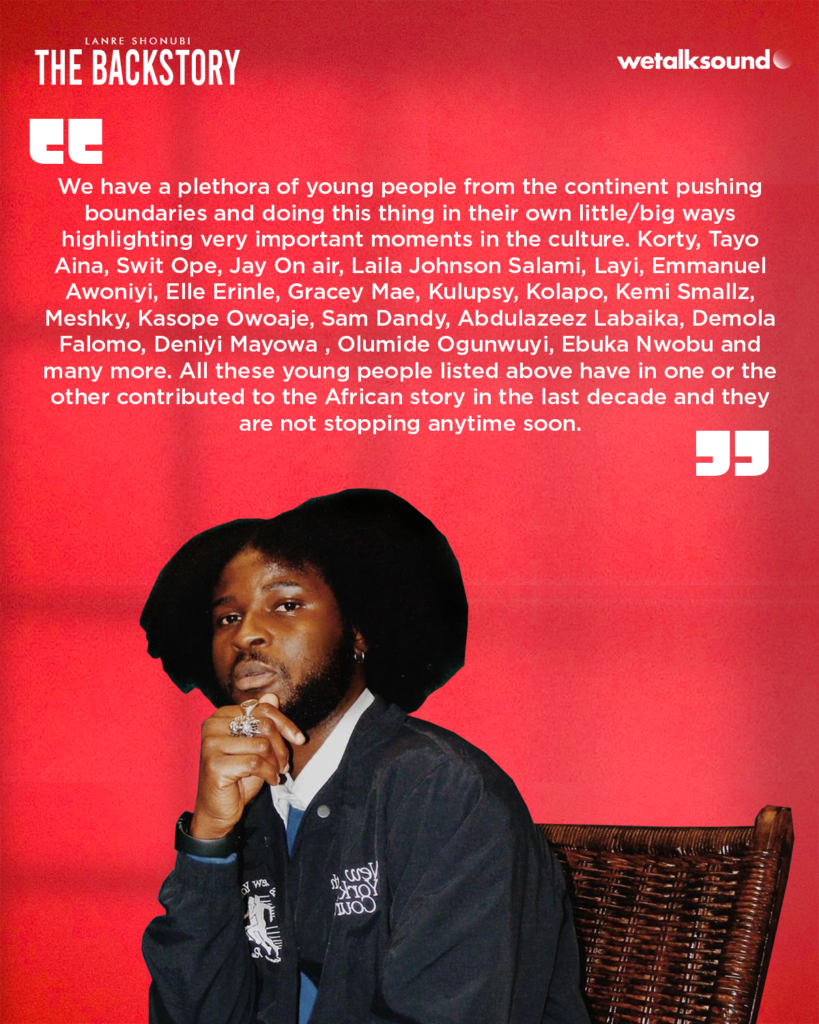
In your experience, how does the reception of Afrobeats differ between the UK and Nigeria? Do you think Nigerian audiences might sometimes underestimate the genre’s global impact?
I honestly think there’s much more the genre has to cover in terms of reach but at this point it is doing very well with platforms like the BBC dedicating a whole weekend to just Afro-Sounds and content which I have been contracted to curate for the second time in a row. I think the Nigerian audience needs to understand that there’s way too many stakeholders involved in sound now and we need to look for a way to stop fighting against the tide rather look for a way to bring all these stakeholders together to get the best out of the sound, some artists and teams are starting to see and they are not holding back with collabs , partnerships and many more but he average Nigerian listeners needs to see this too and understand it.
What factors should Nigerian-based artistes consider when trying to crossover into the UK?
A cross over is very nice and important but a homebase with solid support is also very very key in crossing over. I remember pitching Odumodu to the Daytime Playlist team and 1xtra committee and all I could use for my very strong pitch was the fact that his homebase now loves the sound. I alluded his success to the home base and that convinced them to give the sound a chance. Today OD will get a 1xtra playlist easily as we now understand how important he is to his people, So my advice is solidify home then bring home here.
What is the most meaningful piece of music industry advice you’ve ever received?
The music industry is a thankless one, so do your bit and curate your journey, document everything – Charlotte Bwana (Vice President Audiomack)
What is the most important question the Nigerian music industry should be trying to answer right now as we look to attain more success collectively?
The big question of structure, we are starting to see the importance as labels like Mavin and Choc City have put some of the best structures in place to help push the sound to the ends of the earth and it’s going like mad, if I do say so myself.
What projects are you currently working on?
For the second time concurrently I have been called upon to curate the Afro-Sounds weekender at BBC Radio 1xtra. The weekender is a 3-day exploration of the African sounds which involves producing world class content, scheduling music, writing scripts, booking talents (artist and Djs) for these features to be broadcasted live all through the weekend. The Afro-Sounds weekender is in July and I am excited for this year as it’s bigger and better, you should stay tuned.
I am working on the second edition of my event “My kreative Mind” in London, this is an event I curated in April under my creative agency “TheoRe”. “My Kreative Mind” was set up as a safe space for creatives to discuss various mental health issues that plauge the creative mind. The first edition happened in Lagos with over 70 creatives present and other industry/ media personalities present as well.
Connect with Lanre Shonubi.
